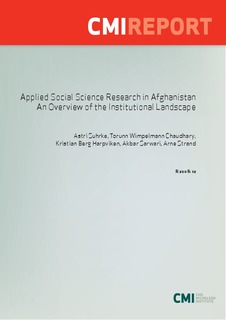| dc.contributor.author | Suhrke, Astri | |
| dc.contributor.author | Wimpelmann Chaudhary, Torunn | |
| dc.contributor.author | Harpviken Berg, Kristian | |
| dc.contributor.author | Sarwari, Akbar | |
| dc.contributor.author | Strand, Arne | |
| dc.date.accessioned | 2009-01-26T12:29:30Z | |
| dc.date.accessioned | 2017-03-29T09:13:10Z | |
| dc.date.available | 2009-01-26T12:29:30Z | |
| dc.date.available | 2017-03-29T09:13:10Z | |
| dc.date.issued | 2008 | |
| dc.identifier.isbn | 978-82-8062-308-9 | |
| dc.identifier.issn | 1890-503X | |
| dc.identifier.uri | http://hdl.handle.net/11250/2436047 | |
| dc.description.abstract | This report is a preliminary mapping of Afghan institutional capacity in the field of applied social science research, as well as an assessment of the interest in, and potential for, further capacity building. The report focuses on independent research centres and development NGOs that have research activities, and also includes institutes linked to government ministries, the public university sector and (in one case) to a UN agency. At present these are the principal sources of policy relevant social research. | |
| dc.language.iso | eng | |
| dc.publisher | Chr. Michelsen Institute | |
| dc.relation.ispartofseries | Research report | |
| dc.relation.ispartofseries | R 2008: 12 | |
| dc.subject | Research | |
| dc.subject | Social sciences | |
| dc.subject | Capacity building | |
| dc.subject | Institutions | |
| dc.subject | Afghanistan | |
| dc.title | Applied Social Science Research in Afghanistan. An Overview of the Institutional Landscape | |
| dc.type | Research report | |
